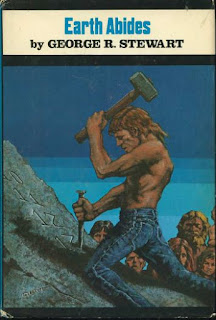Earth Abides, by George R. Stewart
- Get link
- X
- Other Apps
Earth Abides is a Science Fiction Classic, a post-apocalyptic (not dystopian) novel written in 1949. Isherwood, Ish for short, is living in a bungalow in the desert doing research for his thesis when he is bit by a rattlesnake while picking up an abandoned hammer he finds in the sand. When Ish recovers from the bite, many weeks later, he learns that something like 99% of the world's population has succumbed to a flu-like plague. He returns to his parent's home, but they are nowhere to be found, and neither is anyone else in the neighborhood. Strangely, almost everyone is buried. There are survivors, but they are few and far between, individual grains of sand spread across the countryside and cities. Eventually Ish hooks up with several other survivors and the Tribe is born.
I've heard great things about this book from fellow Science Fiction lovers, and there is certainly plenty to chew on here as Stewart puts the tribe through its paces, but I had trouble with the story from the beginning. First, character development is sparse, and the interaction between characters is almost nonexistent. This story is about Ish; everyone else exists just so Ish can fret. We listen in on his thoughts as he spends too much time judging others and worrying about saving civilization from complete collapse. And that's the problem. He spends more time worrying than doing.
ATTENTION: SPOILERS AHEAD!! CONTINUE AT YOUR OWN RISK.
Hint: He fails to save civilization, and that's my second problem with the story.
The founders of the Tribe, those who survived the plague, fail to impose any structure or discipline on their society or their children. They let their kids do pretty much whatever they want to do rather than insist they learn to read and write, learn to raid libraries for books containing general, practical knowledge, and learn to do useful trades and crafts. There is a carpenter in the tribe, and Ish knows some medicine, yet neither takes on an apprentice. Can you believe that? So eventually all knowledge is lost. I consider this a crime against humanity. Being a noble savage sounds good, maybe even fun, but you die young and often in pain. How many teeth will rot out of young mouths, and how many lives will be lost to pathogens and parasites that did not have to be lost if only the founders had insisted on their children attending home school?
But don't listen to me. I guarantee you my reaction and review is in the minority. People love this book, and maybe you should read it too. After all, it is part of Science Fiction's canon. And to be fair, Stewart does do a good job presenting the life-and-death cycle of man the species, and as the closing line says, man comes and goes but the Earth Abides.
I've heard great things about this book from fellow Science Fiction lovers, and there is certainly plenty to chew on here as Stewart puts the tribe through its paces, but I had trouble with the story from the beginning. First, character development is sparse, and the interaction between characters is almost nonexistent. This story is about Ish; everyone else exists just so Ish can fret. We listen in on his thoughts as he spends too much time judging others and worrying about saving civilization from complete collapse. And that's the problem. He spends more time worrying than doing.
ATTENTION: SPOILERS AHEAD!! CONTINUE AT YOUR OWN RISK.
Hint: He fails to save civilization, and that's my second problem with the story.
The founders of the Tribe, those who survived the plague, fail to impose any structure or discipline on their society or their children. They let their kids do pretty much whatever they want to do rather than insist they learn to read and write, learn to raid libraries for books containing general, practical knowledge, and learn to do useful trades and crafts. There is a carpenter in the tribe, and Ish knows some medicine, yet neither takes on an apprentice. Can you believe that? So eventually all knowledge is lost. I consider this a crime against humanity. Being a noble savage sounds good, maybe even fun, but you die young and often in pain. How many teeth will rot out of young mouths, and how many lives will be lost to pathogens and parasites that did not have to be lost if only the founders had insisted on their children attending home school?
But don't listen to me. I guarantee you my reaction and review is in the minority. People love this book, and maybe you should read it too. After all, it is part of Science Fiction's canon. And to be fair, Stewart does do a good job presenting the life-and-death cycle of man the species, and as the closing line says, man comes and goes but the Earth Abides.
- Get link
- X
- Other Apps



i loved this book when i read it sixty years ago... if i read it now - probably not so much... but the final scene with the son carrying his father has stuck in my mind... (not really a spoiler) i remember thinking at the time that Stewart had possibly grown unappreciative of the characteristics of the human species en masse..
ReplyDeleteHey, Mudpuddle.
ReplyDeleteI agree about the ending. Jack was the son (great grandson) who carried Ish. Very touching. And when telling Ish something, Jack always says "as you well know, Ish," what I consider to be an act of respect, even reverence, (age and only surviving founder), because Jack certainly knows Ish does not know. (At least that's how I interpreted it.) I also thought the passing of the hammer was wonderfully done -- how once it passed to Jack, the others sat slightly apart from him. It's about how myths and their artifacts start.
Huh. No new blog entries sine 2022. I hope you are well as you hope you might be years later.
ReplyDeleteI am one of the fervent, long-time lovers of this book. I reread it regularly. I will proselytize others to read it until my dying breath fades away.
"something like 99% of the world's population has succumbed"
---- Many, many more died. He encountered perhaps no more than two dozen in his travels across the country, many of them 'broken'. This lack of numbers is a crusher.
"Hint: He fails to save civilization, ...So eventually all knowledge is lost. I consider this a crime against humanity."
---- Not for a lack of trying. He attempted to 'old school educate' the new children born into the tribe. It was simply too hard for him alone to enforce or continue.
---- That said, he helps 'his people' learn new skills to survive moving forward. I will never fault Ish for his guidance of his tribe.
Anyway, I am glad to find a good review of this online. Thanks for sharing your thoughts..!!
...tom...
I'm here. Haven't posted is a while. I had forgotten. Perhaps I'll start up again soon. Thx for stopping by, Tom.
DeleteWow. It doesn't rermember who I am. I'll have to fix that.
ReplyDelete